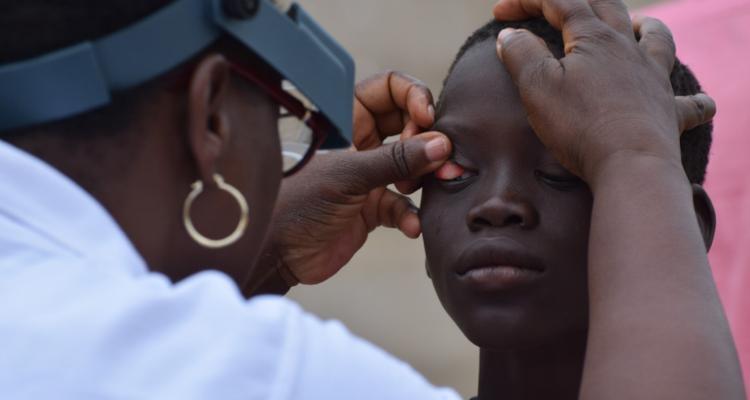
Malawi has become the first country in southern Africa and the fifth in Africa to eliminate blinding trachoma as a public health problem.
The disease is a devastating condition which can turn eyelashes inwards so that they scrape painfully against the eyeball – and if left untreated causes permanent sight loss.
The elimination, announced on 21 September, follows 12 years of sustained action led by the Malawi government with a network of support spearheaded by the non-profit Sightsavers.
Malawi is the first country funded by The Queen Elizabeth Diamond Jubilee Trust to achieve this milestone. The Trust was established in 2012 to create a legacy for Her Majesty Queen Elizabeth II, by eliminating trachoma in the Commonwealth.
Malawi’s announcement follows recent elimination successes in other African countries, namely Morocco, Ghana, The Gambia and Togo. Trachoma is the second neglected tropical disease (NTD) Malawi has eliminated in recent years, following its elimination of lymphatic filariasis in 2020.
Commenting on the issue, President Lazarus Chakwera said he is proud to lead Malawi’s celebration in defeating yet another neglected tropical disease.
“This success in eliminating trachoma – the world’s leading cause of infectious blindness – coming so soon after our country celebrated the elimination of elephantiasis in 2020, shows the fight against neglected tropical diseases can be won.
“I would like to pay special tribute to our wonderful community health workers, many of them women, who played an instrumental role in getting us here. We may be the first in the Southern African Development Community (SADC), but we are determined not to be the last. I urge my fellow Heads of State to endorse the Kigali Declaration on NTDs and commit to its delivery as a gateway to ending NTDs.”
Bright Chiwaula, Sightsavers’ Malawi Director, said eliminating a disease on this scale is a massive achievement for Malawi.
“Today, 9.5 million people are no longer at risk of losing their sight to trachoma thanks to hard work, commitment and collaboration between government, health workers, volunteers and organisations like Sightsavers.
“Malawi’s triumph provides hope and encouragement to our neighbours still working to eliminate the disease. To these countries I say: the strategy we are using works, keep going!”
Dr Matshidiso Moeti, WHO Regional Director for Africa said: “As the former WHO Representative for Malawi and someone who knows the country well, it is with great joy that now I have the opportunity to join in congratulating the Government of Malawi on their remarkable success in eliminating trachoma. What Malawi has achieved can and must be repeated throughout the continent.”
Trachoma is one of the leading causes of blindness worldwide. It stops children going to school and adults from working, trapping people in poverty. To achieve elimination, the Ministry of Health and its partners followed the WHO-endorsed SAFE strategy which combines surgery to stop eyelashes scraping the eye, antibiotics to prevent and treat infection, and facial cleanliness and environmental improvements to stop infection spreading.
The disease affects largely rural and marginalised communities. In the past 20 years, the number of people at risk of trachoma has dropped by 92 per cent, from around 1.5 billion people in 2002 to 125 million worldwide today, according to recent WHO figures. But there is still an urgent need to finish the job – the condition still affects people in more than 40 countries, the vast majority of whom are in Africa.
Malawi’s trachoma elimination plan was supported by the UK Department for International Development (now FCDO) to carry out the initial mapping of the disease. The grants were managed by Sightsavers with drug donations from Pfizer. Subsequent work to achieve elimination was also supported by Sightsavers.
The plan included Working with thousands of volunteers, trained to go into their communities to distribute 22.25 million drug treatments of Zithromax®, donated free of charge by Pfizer.
Malawi also trained local surgeons to manage more than 6,000 advanced cases of trachoma and supported more than 250 schools to adopt improved hygiene and sanitation programmes and encouraging children to use their influence to encourage their families and communities to do the same.
Follow us on Twitter:














